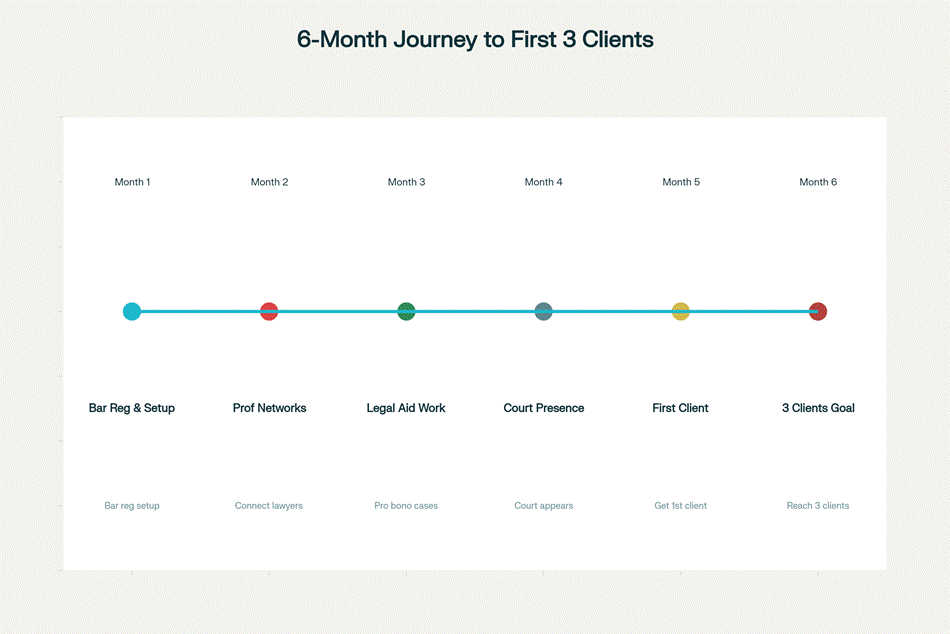How to Get Your First 3 Clients in Criminal Litigation: A Comprehensive Guide for New Lawyers in India
Starting a criminal litigation practice in India presents both tremendous opportunities and unique challenges for new advocates. With over 46 lakh criminal complaints filed annually in India and a legal system that demands skilled representation, the potential for building a successful criminal defense practice is substantial. However, acquiring those crucial first three clients require strategic planning, persistent networking, and a deep understanding of the Indian legal landscape. This comprehensive guide provides actionable strategies for new criminal lawyers to build their client base while navigating the regulatory constraints and competitive environment of the Indian legal profession. [1]
The path to acquiring your first clients in criminal litigation is not just about legal expertise—it involves building relationships, establishing credibility, and creating multiple touchpoints with potential clients and referral sources. Unlike other practice areas, criminal law often deals with urgent situations where clients need immediate legal assistance, creating both challenges and opportunities for new practitioners. Success in this field requires understanding the intersection of legal skill, business acumen, and community engagement within the framework of professional conduct rules established by the Bar Council of India.
Understanding the Criminal Litigation Landscape in India
The Scope and Opportunities in Criminal Law Practice
Criminal law in India encompasses a vast array of offenses ranging from minor misdemeanors to serious felonies including murder, theft, fraud, corruption, and white-collar crimes. The field has evolved significantly with the advent of technology, introducing new areas like cybercrime, financial fraud, and regulatory violations under various special laws including the Prevention of Corruption Act, Protection of Children from Sexual Offences Act (POCSO), and the Information Technology Act 2000. [2][3][4]
The diversity of criminal cases creates multiple entry points for new lawyers. White-collar crimes involving corporate entities and professionals offer lucrative opportunities, while traditional criminal matters provide steady work for building experience and reputation. The increasing digitization of society has also created demand for lawyers specializing in cybercrimes, offering a niche area for tech-savvy advocates. Additionally, the growing awareness of legal rights has increased demand for criminal defense representation across all economic strata. [5]
Market Analysis and Client Demographics
The criminal law market in India serves diverse client demographics, from individual defendants facing charges to corporations dealing with regulatory violations. Understanding your potential client base is crucial for effective targeting and service delivery. High-net-worth individuals and corporate clients typically seek specialized representation for white-collar crimes, economic offenses, and regulatory violations, often paying premium fees for experienced counsel. [2][4]
Middle-class clients commonly require representation for matters involving cheating, fraud, domestic violence, and property-related crimes. These clients are often price-sensitive but represent a large market segment. Lower-income clients, while eligible for legal aid, also seek private representation when they can afford it, particularly for serious charges where their liberty is at stake. Understanding these segments helps new lawyers position their services appropriately and develop targeted client acquisition strategies.

Panel of lawyers and officials at the “LAWYERS’ OF INDIA DAY – 2023” event organized by The Bar Association of India.
Regulatory Framework and Professional Conduct
Bar Council of India Regulations on Marketing and Advertising
New criminal lawyers must navigate the strict advertising restrictions imposed by the Bar Council of India under Rule 36 of the “Standard of Professional Conduct and Etiquettes”. These regulations, rooted in the Victorian-era notion that law is a “noble profession,” prohibit traditional forms of advertising including hoardings, media advertisements, and direct solicitation. However, the 2008 amendment allows limited information sharing through personal websites, creating opportunities for digital presence within ethical boundaries. [6][7]
The prohibition on advertising means that client acquisition must rely heavily on reputation, referrals, and networking rather than promotional activities. This constraint actually benefits new lawyers who focus on building genuine professional relationships and demonstrating competence through their work. Understanding these limitations helps new practitioners channel their marketing efforts into permissible and effective strategies while maintaining professional integrity.
Ethical Considerations in Client Acquisition
Criminal lawyers must maintain strict ethical standards while building their practice, particularly regarding client confidentiality, conflict of interests, and fee arrangements. The legal profession’s emphasis on public service means that commercial considerations must be balanced with professional responsibilities. New lawyers should familiarize themselves with the ethical guidelines governing client solicitation, fee structures, and professional conduct to avoid disciplinary action while building their practice. [6][7]
Building a sustainable criminal practice requires adherence to these ethical standards while finding innovative ways to showcase expertise and build professional networks. The emphasis on professional conduct creates opportunities for lawyers who consistently demonstrate integrity, competence, and dedication to client service, as these qualities become distinguishing factors in a competitive market.
Strategic Networking and Professional Relationships
Building Connections with Senior Criminal Lawyers
One of the most effective strategies for acquiring initial clients is developing relationships with established criminal lawyers who can provide mentorship and referrals. Many successful practitioners started as chamber juniors to prominent criminal lawyers, learning court procedures while building professional networks. The tradition of mentorship in Indian legal practice creates opportunities for new lawyers to access cases and clients through senior advocates who have established practices. [8][9]
Working as a junior advocate provides exposure to different types of criminal cases, court procedures, and client handling techniques. Senior lawyers often refer overflow work or cases that don’t fit their expertise to trusted juniors, creating a pathway for client acquisition. Building these relationships requires demonstrating reliability, competence, and professional conduct consistently. New lawyers should seek opportunities to assist established practitioners in research, drafting, and court appearances to build these valuable professional relationships. [9][10]
Leveraging Bar Association Networks
Local bar associations serve as crucial networking hubs for criminal lawyers, providing opportunities to connect with peers, senior practitioners, and potential referral sources. Delhi alone has several prominent bar associations including the Delhi High Court Bar Association, Delhi Bar Association, New Delhi Bar Association, and various district court bar associations. Active participation in these organizations helps new lawyers build visibility and credibility within the legal community. [11][12]
Bar associations organize regular meetings, seminars, and social events that provide networking opportunities. New lawyers should attend these events consistently, volunteer for committees, and participate in professional development activities. Building relationships with other advocates practicing in complementary areas like civil law, family law, and corporate law can generate referrals when their clients face criminal charges. The collegial nature of bar association interactions helps establish the trust and reputation necessary for sustainable referral relationships.[13][11]
Court-Based Networking and Relationship Building
Regular court appearances provide organic networking opportunities with judges, court staff, prosecutors, and other advocates. Building a positive reputation in court requires consistent professionalism, thorough preparation, and respectful conduct with all parties. Judges and court staff often notice advocates who demonstrate competence and integrity, leading to informal recommendations and referrals.
Establishing good relationships with public prosecutors can also be beneficial, as they often encounter defendants seeking private counsel. Professional interactions during case proceedings, settlement discussions, and bail applications create opportunities to demonstrate expertise and build relationships. Court-based networking requires patience and consistency, as reputation building takes time but generates sustainable long-term benefits.[13][1]

Google reviews summary showing a 4.9-star rating for John T. Floyd Criminal defense law services based on 97 reviews, highlighting client satisfaction and positive feedback.
Legal Aid and Pro Bono Opportunities
Engaging with Legal Aid Clinics and Public Defense
Legal aid work provides an excellent entry point for new criminal lawyers to gain experience while building professional networks and community recognition. The National Legal Services Authority (NALSA) and state legal services authorities provide structured opportunities for advocates to represent indigent clients in criminal matters. These organizations offer nominal compensation ranging from ₹1,500 to ₹7,500 per case but provide valuable courtroom experience and networking opportunities.[14][15][16]
Legal aid clinics often operate in law schools, district courts, and community centers, requiring volunteer advocates to handle various criminal matters. New lawyers can gain exposure to different types of cases, develop courtroom skills, and build relationships with legal aid administrators who may provide future referrals. The experience gained through legal aid work demonstrates commitment to justice and professional service, qualities that attract paying clients and referral sources. [17][14]
Court-Appointed Cases and Public Defense
Many courts maintain panels of advocates for court-appointed cases, particularly for serious offenses requiring mandatory representation. Getting empaneled for court appointments provides steady work and income while building courtroom experience and professional visibility. The process typically involves application to the court registrar or legal services committee, demonstrating basic qualifications and commitment to criminal defense work. [13][18]
Court-appointed cases expose new lawyers to various criminal matters and court procedures while providing networking opportunities with judges, prosecutors, and court staff. Competent handling of appointed cases often leads to recommendations for private clients, as court personnel observe advocate performance firsthand. Building a reputation for thorough preparation and professional conduct in appointed cases creates a foundation for private practice growth.
NGO Partnerships and Community Legal Services
Non-governmental organizations working on criminal justice issues often need legal representation for their beneficiaries, creating partnership opportunities for new lawyers. Organizations focused on human rights, women’s rights, juvenile justice, and police reform regularly encounter individuals requiring criminal defense services. Developing relationships with such organizations can provide steady referrals while contributing to social justice causes. [19][17]
Community legal services programs in urban areas often require criminal law expertise for their clients. Partnering with social workers, counselors, and community organizations helps new lawyers access clients who need representation but may not know how to find qualified counsel. These partnerships require building trust within community organizations and demonstrating consistent professional service to maintain referral relationships.

Client Acquisition Strategy Framework for New Criminal Lawyers
Digital Marketing and Online Presence (Within Legal Boundaries)
Building a Professional Website
The 2008 amendment to Bar Council rules allows advocates to maintain informational websites sharing basic professional details. A well-designed website can serve as a digital business card, providing potential clients with information about practice areas, credentials, and contact details. The key is ensuring content remains informational rather than promotional, focusing on professional qualifications and areas of expertise rather than marketing messages.[6][20]
Criminal lawyers can use websites to share educational content about criminal law, recent legal developments, and general information about criminal procedures. This approach demonstrates expertise while providing valuable information to potential clients. Including testimonials, case results (where ethically permissible), and professional affiliations helps establish credibility. The website should emphasize professional competence and experience while maintaining the dignity associated with legal practice.[20]
Social Media Strategy for Legal Professionals
Social media platforms offer opportunities for professional networking and thought leadership within ethical boundaries. LinkedIn provides a professional platform for sharing legal insights, connecting with other lawyers, and building professional visibility. Regular posts about criminal law developments, court decisions, and legal analysis help establish expertise and attract professional connections who may provide referrals.
Facebook and Twitter can be used for professional purposes, sharing general legal information and building community connections. However, care must be taken to avoid promotional content or client solicitation. The focus should be on education, professional development, and community engagement rather than advertising services. Building a professional online presence takes time but creates multiple touchpoints for potential clients and referral sources to discover and evaluate professional capabilities.[21][20]
Content Marketing and Thought Leadership
Creating valuable content about criminal law topics helps establish expertise and attract potential clients searching for legal information online. Blog posts, articles, and legal guides addressing common criminal law questions provide value to readers while demonstrating professional knowledge. Topics might include explaining bail procedures, rights during police interrogation, or recent changes in criminal law.
Content marketing must remain educational rather than promotional, focusing on providing genuine value to readers. This approach builds trust and credibility while improving search engine visibility. Over time, consistently publishing quality content positions the lawyer as a knowledgeable resource, leading to inquiries from potential clients who have consumed the educational material. The key is maintaining professional standards while providing accessible information about complex legal topics.
Community Engagement and Local Networking
Professional and Community Organizations
Joining professional organizations beyond bar associations expands networking opportunities and credibility. Organizations like the Criminal Lawyers Association, Indian Law Institute, and specialized legal societies provide platforms for professional development and networking with peers. These groups often organize seminars, conferences, and training programs that offer learning opportunities and relationship-building possibilities.[22][23]
Community organizations, business associations, and civic groups also provide networking opportunities. Speaking at community events, participating in legal awareness programs, and engaging in local civic activities helps build community recognition and trust. These activities must be approached with professionalism and focus on education and service rather than client solicitation. Building community relationships takes time but creates a foundation for long-term referral generation.
Speaking Engagements and Educational Programs
Offering to speak at legal awareness programs, community events, and educational institutions helps establish expertise while building professional visibility. Topics might include understanding criminal procedures, rights of accused persons, or recent developments in criminal law. These speaking opportunities demonstrate knowledge while providing valuable community service. [8][24]
Educational institutions, particularly law colleges, often need guest speakers for seminars and workshops. Engaging with academic institutions helps build relationships with future lawyers who may become referral sources. It also provides opportunities to share practical insights about criminal practice while establishing credibility within the academic legal community. These activities should focus on education and professional development rather than self-promotion.
Media Engagement and Public Relations
Within ethical boundaries, engaging with media on legal issues helps establish expertise and professional visibility. Providing expert commentary on criminal law developments, high-profile cases, or legal reforms positions the lawyer as a knowledgeable resource for journalists and the public. This requires deep knowledge of the subject matter and the ability to explain complex legal concepts clearly.
Media engagement must be handled carefully, avoiding promotional content while focusing on educational commentary. Building relationships with legal journalists and media professionals creates opportunities for expert commentary and professional recognition. Over time, regular media engagement establishes the lawyer as a trusted legal expert, leading to inquiries from potential clients who have seen or heard professional commentary.
Client Service Excellence and Retention Strategies
Delivering Exceptional Legal Services
Providing outstanding legal services to initial clients creates the foundation for referrals and repeat business. In criminal law, clients face potentially life-changing consequences, making quality representation crucial. New lawyers must invest significant time in case preparation, legal research, and client communication to demonstrate competence and build trust. Thorough preparation for court appearances, timely filing of applications, and professional conduct in all interactions establish credibility with clients and professional colleagues. [25][26]
Excellence in service delivery involves understanding client needs beyond just legal representation. Criminal defendants often face emotional stress, financial pressures, and social stigma. Providing empathetic client service, clear communication about case progress, and realistic expectations about outcomes builds strong client relationships. Satisfied clients become advocates for the lawyer’s services, providing referrals and testimonials that attract additional clients. [8][25]
Client Communication and Case Management
Effective communication distinguishes successful criminal lawyers from their competitors. Clients need regular updates about case progress, clear explanations of legal procedures, and honest assessments of case prospects. Implementing systematic case management procedures ensures no client matters are overlooked and all deadlines are met. This professional approach builds client confidence and demonstrates competence to potential referral sources. [25][27]
Modern case management tools can help new lawyers organize client information, track case progress, and maintain regular communication. However, personal attention and accessibility remain crucial in criminal law practice. Clients facing criminal charges often need immediate consultation and reassurance. Being available for client calls, promptly responding to inquiries, and providing clear guidance during legal proceedings builds the trust necessary for successful attorney-client relationships. [25]
Building Long-term Client Relationships
Criminal law practice often involves ongoing relationships with clients who may face multiple legal issues over time. Building long-term relationships requires consistent professional service, maintaining client confidentiality, and providing reliable legal counsel. Clients who trust their lawyer’s judgment and professional competence become long-term advocates for the practice, providing referrals and repeat business opportunities.
Maintaining contact with former clients through professional newsletters, legal updates, or occasional check-ins helps preserve relationships and generate future work. Many successful criminal lawyers report that their best clients are those who return for additional services or refer family members and friends. Building these relationships requires genuine care for client welfare and consistent professional service over time. [8]

6-Month Journey to Acquiring First 3 Clients in Criminal Litigation
Financial Planning and Sustainable Practice Development
Fee Structure and Payment Policies
Developing appropriate fee structures for criminal law services requires balancing affordability for clients with financial sustainability for the practice. Criminal law clients often face financial constraints, making flexible payment arrangements necessary. New lawyers should develop clear fee policies that address retainer requirements, hourly rates for different services, and payment schedules for ongoing representation.[2][10]
Many successful criminal lawyers offer free initial consultations to assess cases and build client relationships. This approach allows potential clients to evaluate the lawyer’s competence without financial risk while providing opportunities to demonstrate expertise and professionalism. Clear fee agreements help avoid misunderstandings and establish professional boundaries while ensuring fair compensation for legal services.[25][28]
Managing Cash Flow and Practice Economics
Building a sustainable criminal law practice requires careful financial planning and cash flow management. New lawyers often face irregular income during the initial months of practice, making financial planning crucial for long-term success. Developing multiple revenue streams through legal aid work, court appointments, and private clients helps stabilize income while building experience and professional networks.[1][29]
Understanding the economics of criminal law practice helps new lawyers make informed decisions about case selection, fee structures, and practice development strategies. Tracking key metrics like case volume, average fees, collection rates, and referral sources provides data for making strategic business decisions. Financial sustainability enables lawyers to invest in professional development, office infrastructure, and marketing activities that support practice growth.[29]
Overcoming Common Challenges for New Criminal Lawyers
Dealing with Competition and Market Saturation
The criminal law market in India is highly competitive, with many experienced practitioners competing for clients. New lawyers must differentiate themselves through specialized expertise, exceptional service, or unique value propositions. Focusing on specific areas within criminal law, such as white-collar crimes, cybercrime, or juvenile justice, can help new practitioners establish niche expertise and reduce direct competition with generalist lawyers.[30][1]
Building competitive advantages requires continuous learning, professional development, and staying current with legal developments. New lawyers should invest in specialized training, attend conferences, and develop expertise in emerging areas of criminal law. Creating unique service offerings, such as 24/7 availability for emergency bail applications or specialized expertise in particular types of crimes, helps differentiate the practice from competitors.[26][30]
Managing Stress and Professional Burnout
Criminal law practice can be emotionally demanding, dealing with serious charges, stressed clients, and high-stakes outcomes. New lawyers must develop strategies for managing professional stress and maintaining work-life balance to ensure long-term career sustainability. Building support networks with other criminal lawyers, participating in professional development activities, and maintaining perspective on case outcomes help manage the emotional demands of criminal practice.[31][19]
Developing efficient work habits, setting realistic expectations with clients, and maintaining professional boundaries help prevent burnout while delivering quality legal services. Many successful criminal lawyers emphasize the importance of continuous learning, professional mentorship, and maintaining connections with the legal community for professional support and development.[8][31]
Measuring Success and Continuous Improvement
Key Performance Indicators for Criminal Law Practice
Tracking specific metrics helps new criminal lawyers evaluate practice development and identify areas for improvement. Key indicators include the number of new clients acquired monthly, average case values, client retention rates, and referral source effectiveness. Monitoring these metrics provides objective data for assessing marketing strategies and business development activities.[25][32]
Professional development metrics such as courtroom appearances, case outcomes, and continuing education activities help track skill development and professional growth. Building a reputation for competence requires consistent performance and continuous improvement in legal knowledge and advocacy skills. Regular self-assessment and feedback from clients and colleagues provide insights for professional development planning.
Adapting Strategies Based on Results
Successful client acquisition requires flexibility and willingness to adapt strategies based on results and changing market conditions. Regular evaluation of networking activities, referral sources, and marketing efforts helps identify the most effective approaches for individual practices. What works for one lawyer may not work for another, making personalized strategy development essential.[32][33]
Staying current with changes in criminal law, court procedures, and professional regulations ensures continued effectiveness and compliance. The legal profession continues evolving with technological advances, regulatory changes, and shifting client expectations. Successful criminal lawyers adapt their practices to meet these changing conditions while maintaining professional standards and ethical conduct.[31][5]
Conclusion
Building a successful criminal litigation practice in India requires strategic planning, persistent effort, and commitment to professional excellence. Acquiring the first three clients is just the beginning of a journey that demands continuous learning, relationship building, and adaptation to changing market conditions. Success in criminal law practice comes from combining legal expertise with business acumen, professional networking, and exceptional client service.
The strategies outlined in this guide provide a comprehensive framework for new criminal lawyers to build sustainable practices within India’s unique legal and regulatory environment. From understanding professional conduct rules to leveraging digital marketing opportunities, each element contributes to long-term practice success. The key is implementing these strategies consistently while maintaining the professional integrity and ethical standards that define the legal profession.
New criminal lawyers who focus on building genuine professional relationships, delivering excellent legal services, and contributing to the administration of justice will find ample opportunities for practice growth and professional satisfaction. The criminal justice system depends on competent, dedicated advocates who can navigate complex legal challenges while serving their clients’ interests effectively. By following proven strategies and maintaining professional standards, new lawyers can build thriving criminal law practices that serve both their professional goals and the broader interests of justice.
The path to acquiring your first three clients in criminal litigation may seem daunting, but with proper planning, persistent effort, and commitment to excellence, new lawyers can establish successful practices that make meaningful contributions to the criminal justice system. Remember that every successful criminal lawyer started with their first client, and those who combine professional competence with strategic business development will find opportunities to build rewarding and sustainable legal careers.
- https://blog.ipleaders.in/becoming-successful-criminal-lawyer/
- https://thelegalschool.in/blog/top-criminal-lawyers-in-india
- https://www.indialawoffices.com/services/criminal-litigation
- https://karanjawala.in/practice-area/criminal-litigation-2/
- https://thelegalschool.in/blog/criminal-law-course
- https://docs.manupatra.in/newsline/articles/Upload/C74B86B2-2614-4B56-A50D-8D498A841418.pdf
- https://www.toprankers.com/why-lawyers-cannot-advertise-in-india
- https://www.clio.com/blog/how-new-lawyers-get-clients/
- https://mslawchambers.com/our-team
- https://www.legallyindia.com/convos/topic/165172-how-much-do-juniors-in-chambers-get-paid
- https://delhibarcouncil.com/bar-associations-of-delhi.php
- https://delhibarcouncil.com
- https://www.reddit.com/r/LawFirm/comments/17siu3a/struggling_to_get_clients/
- https://cdnbbsr.s3waas.gov.in/s3ec0490f1f4972d133619a60c30f3559e/uploads/2024/11/2024110665.pdf
- https://nalsa.gov.in/legal-aid/
- https://dslsa.org/legal-aid-wing/
- https://vidhilegalpolicy.in/blog/pro-bono-or-just-unpaid-balancing-the-rights-of-young-lawyers-with-the-pro-bono-mandate/
- https://tiharprisons.delhi.gov.in/tiharprisons/legal-aid-activities
- https://www.shiksha.com/law/criminal-law-career-chp
- https://www.worknex.in/legalmarketing/how-to-get-clients-as-a-lawyer-in-india
- https://growlaw.co/criminal-defense-marketing-services
- https://www.indianbarassociation.org
- https://barindia.in
- https://www.mycase.com/blog/law-firm-marketing/how-do-lawyers-get-new-clients/
- https://www.onthemap.com/blog/how-to-get-criminal-defense-clients/
- https://legal.thomsonreuters.com/blog/marketing-for-criminal-defense-lawyers/
- https://www.saffronedge.com/blog/your-guide-on-how-to-get-clients-as-a-criminal-defense-attorney/
- https://nicolefarber.com/client-acquisition-for-lawyers/
- https://www.linkedin.com/pulse/how-can-1st-generation-lawyer-stand-out-indias-legal-field-patil-htdmf
- https://lawrank.com/criminal-defense-lawyer-marketing/
- https://www.linkedin.com/pulse/what-opportunities-criminal-lawyers-india-namrata-patil-p7saf
- https://rankings.io/blog/how-to-get-clients-law-firm/
- https://growlaw.co/blog/how-to-get-clients-as-a-lawyer
- https://www.luciensolutions.com/blogs/13-innovative-online-marketing-tips-for-law-firms-in-india-for-2025
- https://goconstellation.com/criminal-defense-marketing/
- https://attorneys.media/10-tips-for-lawyers-to-market-online/
- https://rankings.io/services/criminal-defense-lawyer-marketing/
- https://sunhousemarketing.com/5-social-proof-strategies-to-increase-client-acquisition-for-your-law-firm/
- https://comradeweb.com/blog/how-to-get-more-criminal-defense-clients/
- https://www.bestlawyers.com/article/client-testimonials-enhancing-law-firm-client-acquisition/5933
- https://www.onthemap.com/blog/criminal-defense-attorney-marketing-guide/
- https://lawmarketingqueens.com/2023/11/01/the-ultimate-guide-to-acquiring-criminal-defense-clients-elevate-your-practice-with-these-strategies/
- https://www.maheshwariandco.com/practice-areas/criminal-law/
- https://www.linkedin.com/posts/viveksood1_when-should-i-start-my-litigation-practice-activity-7192723129016672256-aOmL
- https://lawzana.com/criminal-defense-lawyers/new-delhi
- https://www.maheshwariandco.com
- https://legalbots.in/blog/can-lawyers-advertise-their-services-in-india
- https://www.reddit.com/r/LawFirm/comments/1d823r7/solo_firm_owners_how_did_you_start_getting_clients/
- https://www.thelegum.com
- https://www.adlegal.in/criminal-defense-lawyers/
- https://in.indeed.com/career-advice/finding-a-job/how-to-become-a-criminal-lawyer
- https://www.conceptlegal.in
- https://www.legal500.com/c/india/white-collar-crime
- https://kochhar.com/people/rohit-kochhar/
- https://www.youtube.com/watch?v=3dLFz0BC7ZQ
- https://chatterjee-law.com/newsletter/f/how-to-start-a-legal-practice-in-criminal-law
- https://in.linkedin.com/company/phoenix-law-chambers
- https://blog.ipleaders.in/junior-advocate-struggles-legal-career/
- https://www.youtube.com/watch?v=LhCsacgX0j0
- https://www.vakilkaro.com/best-criminal-advocate-and-lawyer-for-white-collar-crime-and-fraud-in-noida
- https://www.bajajfinserv.in/how-to-become-criminal-lawyer
- https://blog.ipleaders.in/what-happens-in-court-is-no-more-a-mystery-to-clients-manu-sharma-top-criminal-lawyer/
- https://in.indeed.com/q-advocate,-junior-lawyer-l-delhi-jobs.html
- https://www.youtube.com/watch?v=yBec5LAdoLg
- https://www.indianlegalassociation.org
- https://in.indeed.com/q-law-chamber,-law-firm,-junior-associate-l-delhi-jobs.html
- https://superlawyer.in/augustine-chatterjee-setting-up-independent-litigation-practice-being-junior-litigator/
- https://www.cede.co.in/empanelled-network
- https://www.swedenabroad.se/globalassets/ambassader/indien-new-delhi/documents/list-of-lawyers-india.pdf
- https://kapilchandna.legal
- https://amlegal.in/best-criminal-lawyer-in-delhi/
- https://www.centurylawfirm.in
- https://www.zolvit.com/lawyers/criminal
- https://www.sci.gov.in/legal-aid/
- https://advocaterohitdandriyal.com
- https://abalawoffice.in/legalaid.php
- https://dslsa.org











![Maneka Gandhi v. Union of India [1978] 2 SCR 621: A Watershed Moment in Indian Constitutional Jurisprudence](https://www.infipark.com/articles/wp-content/uploads/2026/02/Image-Feb-18-2026-10_47_59-AM-218x150.jpg)








